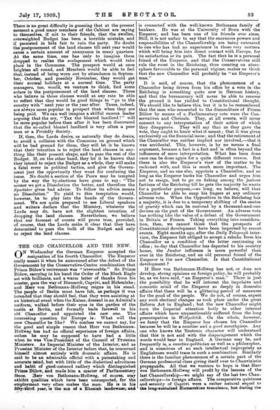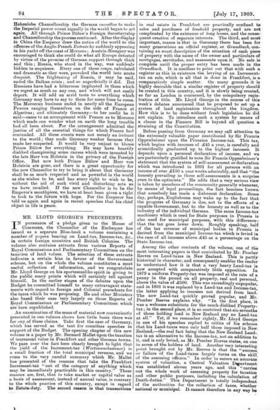. THE OLD CHANCELLOR AND THE NEW.
ON Wednesday the German Emperor accepted the resignation of hie fourth Chancellor. The Emperor really Meant it when he announced after the defeat of the Governmeht by the Conservative-Centre combination that Prince Billow's retirement was "irrevocable." So Prince Billow, carrying in his hand the Order of the Black Eagle set with brilliants, and a warm letter of thanks from his master, goes the way of Bismarck, Caprivi, and HOhenlohe ; and Herr von Bethmann-Hollweg reigns in his stead. The people of Berlin must have felt, as perhaps it was intended that they should feel, that they were assisting at an historical event when the Kaiser, dressed in an Admiral's intiform, walked before their eyes in the garden of the castle at Berlin, and formally bade farewell to his old Chancellor and appointed the new one. The interesting question for Europe is : What will the new Chancellor be like? We confess we cannot say, for the good and simple reason that Herr von Bethmann- Hollweg has had no official experience of foreign affairs, uelees he may be supposed to have had a little when he WIN Vice-President of the Council of Prussian Ministers. As Imperial Minister of the Interior, and as Prussian Minister of the Interior before that, he concerned hitheelf almost entirely with domestic affairs. He is said to be an admirable official with a painstaking and accurate mind, but with little of the dialectical adroitness and habit of good-natured raillery which distinguished Prime Billow, and made him a master of Parliamentary fitnoe, Rerr von Bethinann-Hollweg, of course, mar ethibit qualities which have been unsuspected, for the employment very often makes the man, He it in hie fifty.third year, i* the son of a Rhenish landowners mad is connected' with the well-known Bethmann family of bankers. He was at the University of Bonn with the Emperor, and has been one of his friends ever since. Still, it is not unfair to say that the enormous powers and responsibilities of the Chancellorship are being entrusted to one who has had no experience in those very matters which will bring him into direct contact with Europe, for its satisfaction or its pain. The fact that he is a personal friend of the Emperor, and that the Conservatives still rule the roost in the Reichstag, thus creating an atmo- sphere favourable to the personal regime, makes us think that the new Chancellor will probably be "an Emperor's tuan."
It is said, of course, that the phenomenon of a Chancellor being driven from his office by a vote in the Reichstag is something quite new in German history, and that the bureaucracy will neVer be able to recover the ground it has yielded to Constitutional thought. We should like to believe this, but it is to be remembered that the seen who consented to the discomfiture of Prince Billow by means of a Parliamentary vote were the Con- servatives and Clericals. They, at all events, will never consent to any interpretation of their action of which they disapprove. They will say that as they gave the vote, they ought to know what it meant ; that it was given exclusively on the financial issue ; and that the retirement of the Chancellor was neither implied nor involved,—that it was accidental. This, however, is by no means a final argument, because a fact is a fact and is often beyond the influences of mere interpretation. What has been done once can be done again for a quite different reason. But there is also the Emperor's view of the matter to be reckoned with, and this is much more important. The Emperor, and no one else, appoints a Chancellor, and so long as the Emperor backs his Chancellor and urges him not to resign, but to go on fishing among the jealous factions of the Reichstag till he gets the majority he wants for a particular purpose,—so long, we believe, will that Chancellor be able to snap his fingers at any ordinary adverse vote. When the Opposition in the Reichstag has a majority, it is due to a temporary shifting of the centre of gravity which can be restored by a thousand-and-one devices on the part of the Government. An adverse vote has nothing like the value of a defeat of the Government in Britain or France. Taking everything into considera- tion, then, we cannot think that the prospects of Constitutional development have been improved by recent events. Eight months ago, after the Daily Telegraph inter- view, the Emperor felt obliged to accept a rebuke from his Chancellor as a condition of the latter continuing in office ; to-day that Chancellor has departed to his country house, the Junker influence is more powerful than ever in the Reichstag, and an old personal friend of the Emperor is the new Chancellor. Is that Constitutional development ?
If Herr von Bethmann-Hollweg has not, or does not develop, strong opinions on foreign policy, he will probably be, as we have said, "an Emperor's man." There is just the possibility that he will interest the impulsive and romantic mind of the Emperor so deeply in domestic affairs that there will be a glittering period of measures for the good of the people. We do not, of course, expect any such electoral changes as took place under the great Reform Act in England ; but the new Chancellor might turn the Imperial attention hotly to other internal affairs which have unquestionably suffered from the long preoccupation in Weltpolitik. On the whole, however, we fancy that the Emperor has chosen his Chancellor because he will be a courtier and a good mouthpiece. Any one who knows the Teutonic character will understand that this is not said with the disparagement which the words would beat in England. A German may be, and frequently is, a courtier-politician as well as a philosopher, and is conscious of no such intellectual impropriety as Englishmen would trace in such a combination. Similarly there is the familiar phenomenon of a certain part of the German professorial class giving itself over to Chauvinistic propaganda. All that we venture to hope is that Herr von Bethmann-Hollweg will profit by the lessons of the last Chancellorship—we might say of the last two Chan- cellorships—in foreign affairs. The comparative quietness and serenity of Caprivi were a rather natural sequel to tia• long,sustained Bismareltiatt truculence, but during the Hohenlobe Chancellorship the German cacoethes to make the Imperial power count signally in the world began to act again. All through Prince Billow's Foreign Secretaryship and Chancellorship the process continued. After the display it. China the Emperor drew the notice of the world to the offences of the Anglo-French Entente by suddenly appearing in his yacht oft the coast of Morocco ; Austria-Hungary was encouraged to think she could do what all Europe detested by virtue of the promise of German support through thick and thin ; Russia, who stood in the way, was suddenly bidden to acquiesce. Every one of these coups, calculated and dramatic as they were, provoked the world into acute disquiet. The frightening of Russia, it may be said, ended the Balkan crisis ; and so superficially it did. But Russians have had a bitterness implanted in them which we regret as much as any one, and which will not easily depart. It will add an acrid taste to everything which Germany may have to say to them for some time to come. The Moroccan business ended in nearly all the European Powers ranging themselves on the side of France at Algeciras ; and ultimately Germany—to her credit be it said—came to an arrangement with France as to Morocco which made one wonder what on earth the long trouble had all been about. For the arrangement admitted the justice of all the essential things for which France had contended. All these events were not merely an irritant to the world ; they made Germany weaker because they made her suspected. It would be very unjust to blame Prince Billow for everything. He may have heartily disliked championing some causes which were invented by the late Herr von Holstein in the privacy of the Foreign Office. But now both Prince Billow and Herr von Holstein are gone, and there is a great opportunity for the new Chancellor to try to bring it about that Germany shall be as much respected and as powerful in the world as she wishes to be, and has every right to wish to be, without the aid of such vivi4 and disturbing acts as we have recalled. If the new Chancellor is to be the Emperor's mouthpiece, we have at least been given a right to look to the future with hope. For the Emperor has told us again and again in recent speeches that his chief object in life is peace.









































 Previous page
Previous page